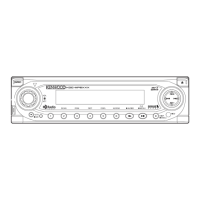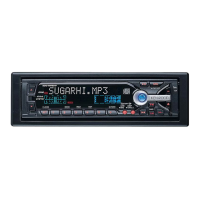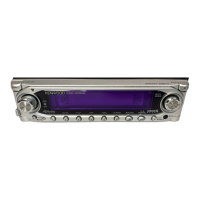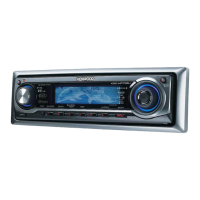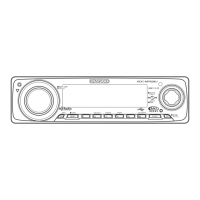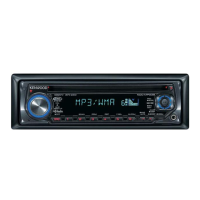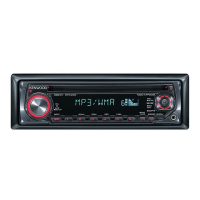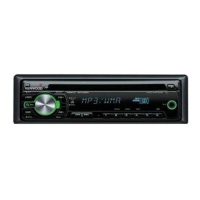Do you have a question about the Kenwood KDC-MP6043U and is the answer not in the manual?
Instructions for first-time use, including cancelling demonstration mode.
How to reset the unit to factory settings if it malfunctions.
Guide on cleaning the unit, faceplate terminals, and handling lens fogging.
Proper handling of CDs and identifying unusable discs.
Important warnings to prevent injury, fire, or damage during use.
Explanation of power, source selection, volume, subwoofer output, and auxiliary input.
Steps and precautions for detaching and reattaching the unit's faceplate.
How to scroll text and titles on the display using the AUD knob.
How the audio system mutes automatically during a phone call.
Registering and recalling favorite stations, playlists, or artists for quick access.
How to operate the tuner, including band selection, tuning, and preset memory.
Instructions for playing CDs, USB devices, and iPods, including search functions.
Overview of the built-in microphone for hands-free calls.
Settings for automatic memory entry and iPod control modes.
Options for controlling music playback modes like file scan, random, and repeat.
Registering, selecting, and deleting Bluetooth devices.
Settings for downloading SMS and configuring voice recognition.
Settings for microphone gain, noise reduction, speaker selection, display options, and audio presets.
How to delete favorite preset memories and manage them.
Steps to access the Function Control menu.
How to navigate menus, select items, and make adjustments.
How to exit the Function Control menu.
How to change the information displayed for each source.
Customizing the display when switching to the auxiliary input source.
How to search for music on audio files and internal CDs.
How to search for songs on an iPod.
Using the first letter to quickly find music items.
How to use the skip search function for a set ratio of songs.
How to play all songs on an iPod in random order.
How to control the iPod directly from the iPod itself.
Searching for music by entering the track number.
Searching for a disc by entering its number.
Basic operations for a CD changer, including source selection and search.
Automatically storing stations with good reception.
How to manually store favorite radio stations.
Recalling stored radio stations.
Tuning to a specific frequency using remote control.
Changing the tuning frequency step.
Prerequisites for using hands-free phone function, including registration.
How to answer or reject incoming calls.
Options while on a call, including disconnecting and switching to private mode.
Handling multiple calls, answering, and switching between them.
Clearing disconnection messages and switching display modes.
Procedures for dialing a number or selecting a preset dial.
Manually entering a phone number using the remote control.
Using preset numbers for quick dialing.
Searching and calling contacts from the phone book.
Dialing numbers from outgoing, incoming, or missed call lists.
Making calls using voice commands for names or categories.
Adding phone numbers to the preset dial list.
Information on phone number categories displayed in the phone book.
Setting a 4-digit security code for the unit.
Removing the security code function.
How to enter the security code when required.
Setting the unit's clock time.
Turning the unit's demonstration mode on or off.
Adjusting various audio parameters like volume, bass, treble, and system Q.
Fine-tuning bass, middle, and treble levels.
Configuring sound system settings like filters, subwoofer phase, and dual zone.
Optimizing system Q by setting the speaker type.
Saving and recalling custom audio settings.
Retrieving previously saved audio settings.
Registering favorite stations, playlists, or phone numbers for quick access.
Retrieving registered preset memory items.
Removing registered preset memory items.
Assigning custom names to preset memory entries.
Pairing a Bluetooth device with the unit for hands-free use.
Procedure for pairing devices that may not register normally.
Setting or editing the PIN code for Bluetooth pairing.
Transferring phone book data from a mobile phone to the unit.
Choosing which registered Bluetooth device to use for connection.
Removing paired Bluetooth devices and associated data from the unit.
How to check the unit's firmware version for updates.
Registering voice tags for phone book entries to enable voice dialing.
Assigning voice tags to phone number categories for voice dialing.
How incoming SMS messages from the phone are displayed on the unit.
Navigating and viewing SMS messages from the phone's inbox.
Transferring SMS messages from the phone to the unit for reading.
Remote control functions for tuner band, station selection, and preset recall.
Remote functions for music and folder selection on CDs/USB.
Remote control for TV input and preset channel recall.
Basic remote functions like volume and source selection.
Using the remote to select and adjust audio settings.
Switching dual zone system and adjusting rear volume.
Remote functions for making calls, dialing, and answering.
Handling call waiting scenarios remotely.
Remote functions for ending calls and adjusting volume.
Instructions for inserting and replacing batteries in the remote control.
Details on playable audio file formats and disc media.
Information on USB device compatibility, charging, and connection.
Bluetooth specifications and profiles supported by the unit.
Explanation of menu items like AMP, AUTO ANS, AUX, CALL BEEP, CD READ.
Specific operations for optional accessories.
Explaining display indicators for Bluetooth status, signal strength, and battery level.
Adjusting microphone gain and noise reduction levels for calls.
Configuring speaker output and the SUPREME function.
Setting the destination for the auxiliary input source in dual zone mode.
Information about the Class 1 laser product warning label.
List of included accessories with part numbers.
Step-by-step guide for installing the unit.
Notes on connecting external CD changers.
Tips for ensuring good Bluetooth and radio reception.
How to connect AUX input and USB devices.
Diagram showing connections for front and rear speakers.
Details on connecting power, antenna, mute, dimmer, and ignition wires.
Instructions for removing the unit's mounting frame.
Step-by-step guide for detaching the main unit from the dashboard.
Warnings about hot surfaces and handling tools during installation.
Troubleshooting common problems like no touch sensor tone.
Addressing poor radio reception and antenna issues.
Problems with disc playback, such as dirty or scratched discs.
Troubleshooting audio skips due to media condition or recording quality.
Solutions for low call volume, no rear speaker sound, or no incoming call beep.
Explaining error codes and messages like TOC ERROR, ERROR 05, ERROR 77, ERROR 99, IN (Blink), PROTECT (Blink).
Troubleshooting specific errors related to USB devices and iPods.
Explaining Bluetooth connection errors like HF DISCONCT, UNKNOWN, DEVICE FULL.
Technical details for the FM tuner, including frequency range and sensitivity.
Technical details for the AM tuner, including frequency range.
Bluetooth version, frequency range, output power, and profiles.
Technical specifications for the CD player, including filter, speed, and audio output.
Details on USB standard, supply current, file systems, and media decoding.
Power output, impedance, tone controls, and preout levels.
Frequency response, input voltage, and impedance for auxiliary input.
Operating voltage, current consumption, dimensions, and weight.
Table indicating presence of hazardous substances in components.
| Brand | Kenwood |
|---|---|
| Model | KDC-MP6043U |
| DIN Size | Single DIN |
| Channels | 4 |
| RMS Power Output | 22 Watts |
| Peak Power Output | 50 Watts |
| Tuner | AM/FM |
| CD Player | Yes |
| MP3 Playback | Yes |
| WMA Playback | Yes |
| USB Port | Yes |
| Auxiliary Input | Yes |
| Bluetooth | No |
| Remote Control | Yes |
| Display Type | LCD |
| Detachable Faceplate | Yes |
| RMS Power Bandwidth | 20 Hz - 20 kHz |
| CD Signal-to-Noise | 105 dB |
| CD Frequency Response | 5 Hz - 20 kHz |
| CEA-2006 Compliant | Yes |
| ID3 Tag Display | Yes |
| Sub Preamp Outputs | Yes |
| HD Radio | No |
| Navigation | No |
| Type | Receiver |
| Preamp Outputs | 3 |
| Preamp Voltage | 2.5V |
| iPod Compatibility | Yes |
| Satellite Radio Ready | Yes |
